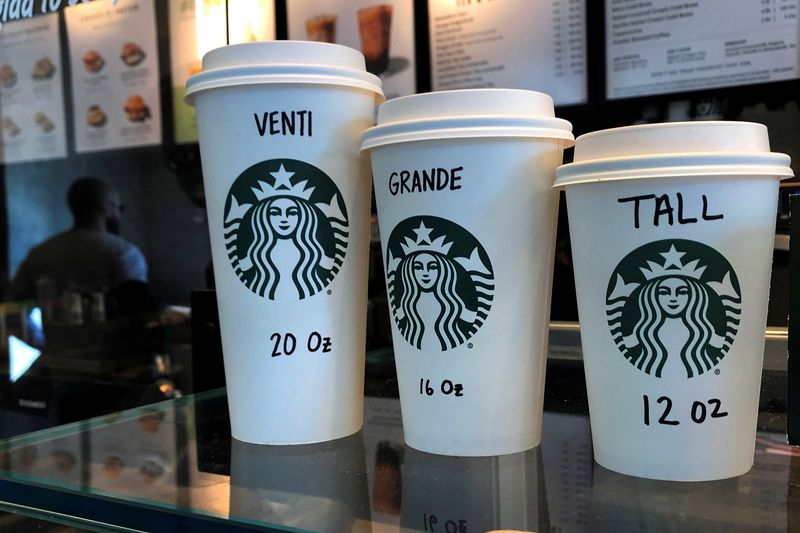By Andrew Chung and John Kruzel
WASHINGTON (Reuters) -U.S. Supreme Court justices on Tuesday signaled support for Starbucks (NASDAQ:SBUX) in the coffee chain's challenge to a judicial order requiring it to rehire seven employees at a Memphis cafe who were fired as they pursued unionization.
The justices heard arguments in the Seattle-based company's appeal of a lower court's approval of an injunction sought by the U.S. National Labor Relations Board (NLRB) ordering reinstatement of the workers. The case could make it harder to quickly halt labor practices challenged as unfair under federal law while the NLRB resolves complaints.
The dispute centers on the legal standard that federal courts must use to issue a preliminary injunction requested by the NLRB under a federal law called the National Labor Relations Act. Such orders are intended as an interim tool to halt unfair labor practices while a case proceeds before the board.
Under that law's section 10(j), a court may grant an injunction if it is deemed "just and proper."
Starbucks has argued that the judge who granted the injunction should have used a stringent four-factor test to weigh the bid for an injunction, as courts typically do in non-labor disputes. This test includes an assessment of whether the side seeking relief would suffer irreparable harm and is likely to succeed on the merits of the case.
Some justices appeared to agree that courts, not the NLRB, should have the primary role in determining the likelihood of success in a case before issuing an injunction.
Conservative Justice Neil Gorsuch told Justice Department lawyer Austin Raynor, who was defending the Starbucks injunction, that other federal agencies are subject to the stricter standard.
"In all sorts of alphabet soup agencies, we don't do this," Gorsuch said, using a term describing agencies known by their initials. "District courts apply the 'likelihood of success' test as we normally conceive it. So why is this particular statutory regime different than so many others?"
Liberal Justice Elena Kagan pressed Raynor to explain "why courts should apply a lower standard."
Raynor said the reason is "structural" because in unfair labor disputes, Congress intended through the National Labor Relations Act for the NLRB to be the primary adjudicator, not the courts.
"But it also gave this power over injunctions to the court," Kagan replied.
Starbucks contends that if the lower courts had applied stricter criteria, this case would have come out differently.
About 400 Starbucks locations in the United States have unionized, involving more than 10,000 employees. Both sides at times have accused the other of unlawful or improper conduct.
Hundreds of complaints have been filed with the NLRB accusing Starbucks of unlawful labor practices such as firing union supporters, spying on workers and closing stores during labor campaigns. Denying wrongdoing, Starbucks has said it respects the right of workers to choose whether to unionize.
In a break from the acrimony, both sides in February agreed to create a "framework" to guide organizing and collective bargaining and potentially settle scores of pending legal disputes.
'CREAM OF THE CROP'
Raynor told the justices that the NLRB seeks 10(j) injunctions in very few "cream of the crop" cases, last year requesting just seven even though it receives 20,000 unfair labor charges annually.
"This is an expert agency that has said, 'We think these are the most deserving of relief,'" Raynor added.
But conservative Chief Justice John Roberts said that "I don't know why the inference isn't the exact opposite." Roberts said these could be the cases that the board feels "are the most vulnerable."
Conservative Justice Amy Coney Barrett emphasized to Raynor that federal courts serve as "an independent check" on the NLRB's power.
"We acknowledge this isn't a rubber stamp," Raynor replied.
Liberal Justice Ketanji Brown Jackson also noted the relatively small number of injunctions the NLRB seeks annually.
"This is not sounding like a huge problem," Jackson said.
"Whether or not it's a huge problem, what petitioner (Starbucks) wants is just a level playing field," Blatt responded.
The case began in 2022, when the workers at the Memphis Poplar Avenue store became among the first to unionize. They let a television news crew into the Starbucks cafe after hours to talk about the union campaign. Seven workers present that evening were fired, including some belonging to the union organizing committee.
Employees there eventually voted to join the Workers United union.
The union filed NLRB unfair labor charges over the firings and other discipline by managers. The agency sought an injunction, alleging Starbucks unlawfully fired the workers for supporting unionization and to send a message to other workers.

U.S. District Judge Sheryl Lipman granted the injunction in 2022. The Cincinnati-based 6th U.S. Circuit Court of Appeals upheld it in 2023.
The Supreme Court's ruling is expected by the end of June.